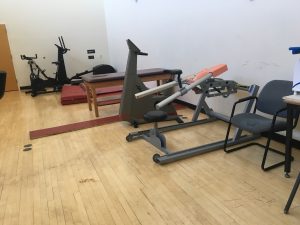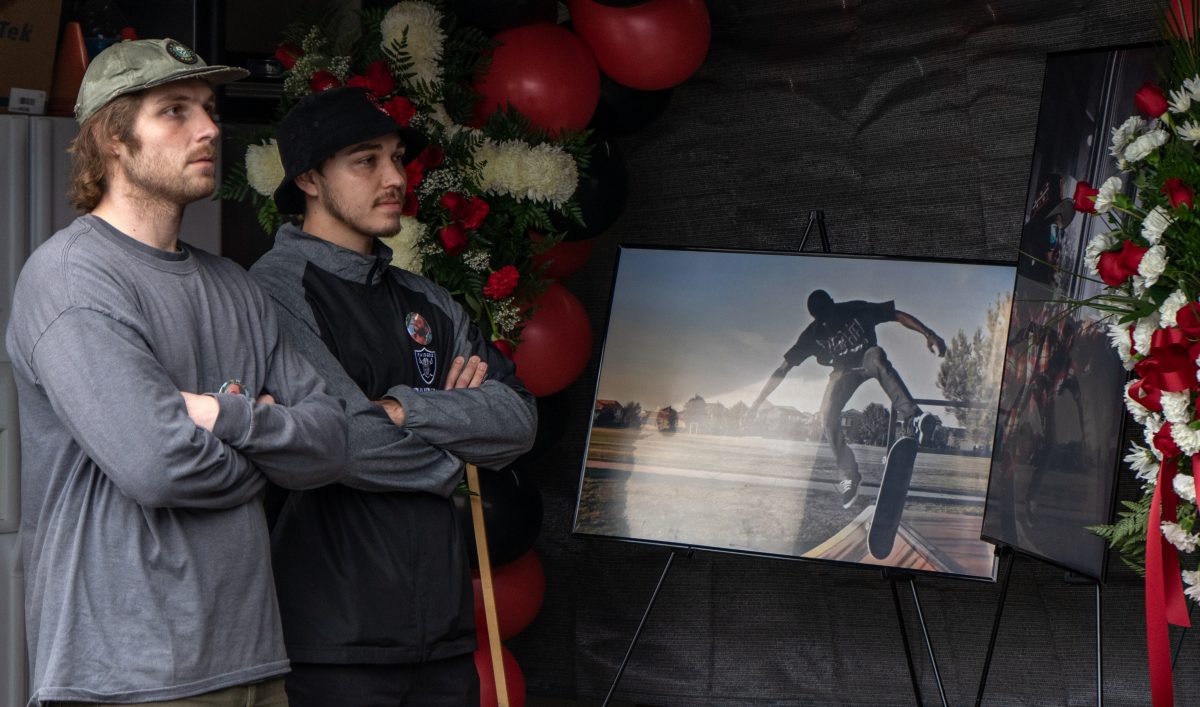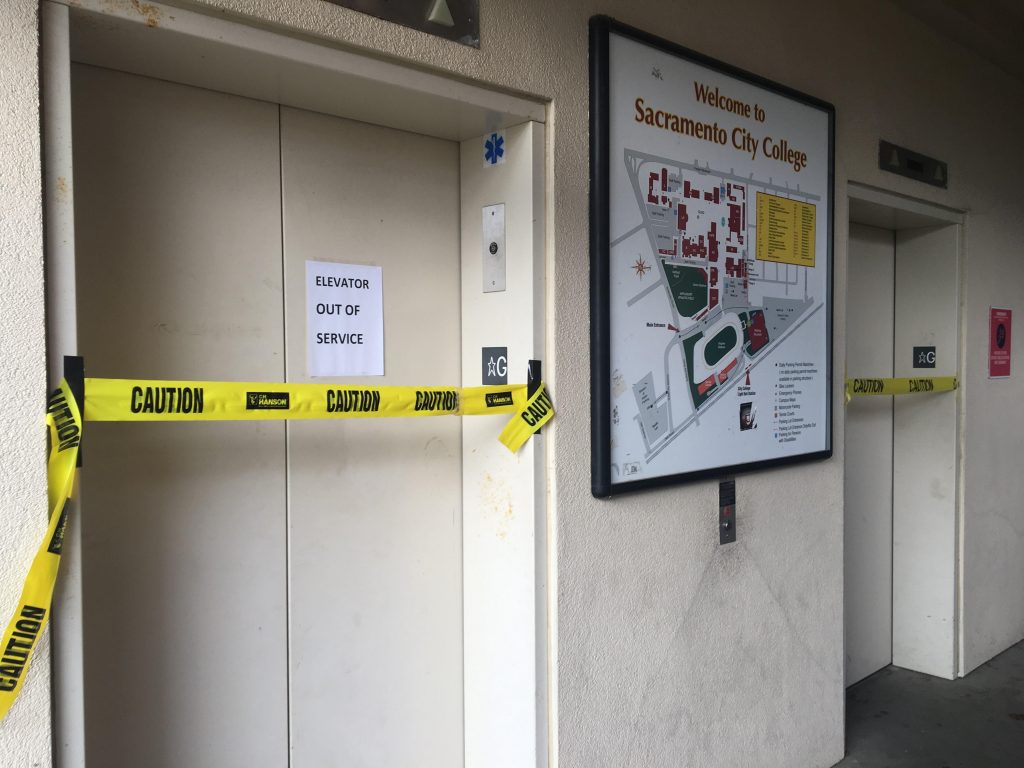Nita Gardipee
Staff Reporter
ngardipee.express@gmail.com
Heather Roegiers
Editor-in-Chief
kroegiers.express@gmail.com
Students with disabilities on campus face a particular set of challenges. From malfunctioning elevators and automatic doors, to cars idling in handicap zones, to a discontinued adapted P.E. class, not everyone is satisfied with City College’s performance in accommodating people with these challenges.
One of two elevators in the main campus parking structure broke down and was stuck between two floors the morning of Feb. 6 according to student Maxfield Morris. The elevator appeared operational the following day. However, this wasn’t the last time the elevators would prove to be malfunctioning.
A week later both elevators in the parking structure malfunctioned, once again, stuck between floors, The elevators were blocked with yellow caution tape. A white paper sign on the left side read: “ELEVATOR OUT OF SERVICE,” with no indication of the cause of the issue, nor an estimated timeline of when the elevators would be fixed. The incident happened some time between noon and 3 p.m. and remained in this condition as of the following day.
“There have been 24 work orders (service calls) for SCC Main Campus elevators over the past 6 months,” said Gabe Ross, associate vice chancellor of Communications & Media Relations. “Even though the vast majority of these are minor, in each instance the elevator is taken out of commission as a precaution while any problems are addressed.”
While most students can take the stairs, students with mobility issues are often forced to miss class as a result of these malfunctions. When an elevator went down in Rodda Hall North in February, student Felipe Gutierrez was prevented from attending.
“I wasn’t able to get to class at all,” said Gutierrez. “Like actually, the professor came down and told me there was no way for me to get up there at all, because it was on the third floor, because there’s no connecting divider like on the second floor between buildings, so I wasn’t able to go to class at all.”
City College student Julie Coleman has been attending City College intermittently since 1973. Coleman is unable to use stairs and missed a class because of a malfunctioning elevator.
“I started to get real upset because I’ve never missed a class,” Coleman said.
The City College website states that Campus Operations should be notified via telephone in the event of such malfunctions regarding malfunctioning elevators, door and lock issues and repairs that could that could pose a hazard or impact property.
Margaret Lednicky, director of Operations, explains a lot of issues take time because they just aren’t made aware of the malfunction.
“If there’s something we don’t know about, then we don’t know,” said Lednicky. “If we don’t know, then we can’t send the trouble ticket.”
Lednicky said the process to address malfunctions starts with Operations.
“Whenever there’s a malfunction, the process is (to contact) Operations. Once we find out, we call Facilities Management and they dispatch the (elevator) company. That’s who does the repair,” said Lednicky.
While there is a procedure to maneuver students down stairs in case of an emergency, Lednicky said it requires the help of district police.
“In some of the buildings we do have alternate means. If something happened to (the elevator in) Rodda North, then they could go to Rodda South to come down,” said Lednicky. “But there’s obviously no ramp to the third floor of LRC, for example. We have two elevators, you know. Hopefully, they don’t both go at the same time. But if somebody gets stuck on, let’s say, the third floor of LRC, there is a contraption—and I don’t know what it’s called—but the police are trained to bring people down.”
City College student Javier Juarez said he had to use the contraption just earlier this year when a fire alarm went off in LRC.
“They closed the elevators, so I was stuck here while everyone else was running,” said Juarez, who uses a wheelchair. “They say don’t use the elevators in case of a fire, but then I don’t have any way out. I was just stuck here until finally after 15–20 minutes—I don’t know—it was a long time. Finally the police was able to carry me downstairs, but without them, I don’t know.”
Administrative Justice major Dylan Crawford, who requires an elevator for mobility, noticed the recent malfunction in the parking structure. Crawford believes that campus operations has areas for improvement, specifically with parking accessibility.
“Obviously, if they can’t use (the elevator) and they can’t go up (the stairs), then they have to go all the way up to the ramp,” Crawford said.
First-year City College student David Yakimchuk has also experienced issues using his wheelchair on campus.
“I did notice that the elevator up on Rodda South side was having issues one time,” Yakimchuk said. “Then I went across to Rodda North and used their elevator.”
According to ADA regulations, buildings with three or more floors must have at least one passenger elevator to meet the ADA’s accessibility requirements. Private buildings that are less than three floors do not have to provide an elevator unless they are a shopping center, professional office or other specified type of use.
Besides elevators, students with disabilities say they also encounter issues with malfunctioning doors. Juarez said the cafeteria restroom’s door is particularly troublesome.
“You have to pull it,” said Juarez. “The only problem is when I push anything, you know (from a wheelchair), I’m pushing myself back, so I have to—with the brake and then—push,” Juarez said, while grabbing the edge of a table and pivoting in his chair. “It’s complicated. There’s nothing dangerous or impossible, but it’s a hazard. ”
Gutierrez said he’s also inconvenienced when some automatic doors fail.
“The business building—those doors are heavy,” said Gutierrez. “I mean, I still can pull it open, but they’re heavy. Sometimes the doors, like the sensors won’t work, so you have to go through the manual door.”
Lednicky said Operations is aware of the problem.
“Currently we do have a few issues on campus about that,” said Lednicky, “And those are trouble tickets, and they’ve been—they are definitely on it. It’s just, again, it’s not just a matter of changing a battery, there are things involved with it.”
Coleman said she was also concerned with the lack of enforcement in the disabled parking drop-off loop between Rodda Hall North and the Student Services building. Coleman commutes to campus via Paratransit shuttle, which has a firm, five-minute grace period at each stop to stay on schedule. Coleman said she’s been left behind because of vehicles without disabled placards parked or waiting in the loop, blocking access and turn-around space for the Paratransit vehicles.
Students with disabilities have already been facing issues integrating into the physical education curriculum due to under-enrollment. Dean of Kinesiology Mitch Campbell said City College faculty voted to no longer support the adaptive P.E. program after consistently low enrollment. This change went into effect in fall 2017.

ARC and CRC still offer adaptive P.E. courses, said Campbell. Disabled students who wish to take adaptive P.E. classes must commute to one of these campuses.
The space previously used for the adaptive P.E. class and the modified equipment that was used for that program is now being utilized for the new spin bike classroom, said Campbell. The modified equipment was relocated to Room 203 on the second floor of the North Gym.
Students with disabilities have been integrated into the mainstream fitness classes, said Campbell. All fitness classes are open to these students with accomodations made as needed. However there are several fitness classes designed to cater to the special needs of these students including aquatic aerobics, yoga, walking, weight training as well as spin bike courses.
Campbell said he encourages students with disabilities to utilize the life fitness center, which essentially functions as an open gym.
“The life fitness center is our best experience,” Campbell said.
According to Disability Services Counselor Toni Newman, the college is responsible for making the campus and courses accessible for all students, while the Disability Services and Programs for Students (DSPS) is responsible for providing accommodations if students still need support in accessing the curriculum.
“All (fitness) courses are now supposed to be accessible to students that otherwise would have used Adaptive P.E.,” Newman said. “There (are) specific courses that are better suitable for students with those needs.”
Newman said the school’s curriculum is open to students of all abilities.
“We can’t tell someone they can’t do something,” Newman said. “There might be classes that are more appropriate or inappropriate, but there’s no disallowing. What that professor has to do is, based on that student’s ability, make accomodations in that class.”
Despite these issues, most students with disabilities are satisfied overall with the campus. Gutierrez said there are other institutions performing far worse that he’s had to deal with.
“It’s not the best, but average,” said Gutierrez. “They could fix or make the pathways a little smoother, but for meeting the (ADA) requirements, I would say it’s average.”
Juarez said he has no serious concerns.
“Some instances, it might take weeks, other instances, it might take years,” said Juarez, “But overall, everything has been addressed and the school is very functional.”
Juarez said he understands why fixing problems with campus facilities take time.
“Some things are really urgent,” said Juarez, “Like if at the bathroom here, the water is flowing like a river, well, they have to run and fix it, that’s for sure, but that’s exactly the same people who also have to take care of the handicap shower at the swimming pool. So they have all sorts of little tiny things going on. Yeah, you have to wait.”
Juarez said that the shower for people with disabilities at the swimming pool needed to have its temperature adjusted, a problem he said he had been complaining about for two years.
“When I talked to (the DSPS), it got fixed in, like, a month,” said Juarez. “Before, I complained to the people at the swimming pool and the swimming instructor, and then I ended up going to Operations, and then go to Operations manager, nothing, and then I said, ‘Well, I don’t want to do this, but I’ll go to Disability so they can hassle these guys,’ and it got fixed.”
Students facing any issue with accessibility can direct those concerns to the DSPS office, according to Disability Services Counselor Toni Newman. The DSPS functions as an advocate for students with disabilities. When Newman receives a student concern or complaint, she will send it to the proper place to ensure that the issue gets handled.
“Students need to know to complain, though. Don’t complain to each other. Complain to one of us, ‘cause we won’t know. If no one tells us, we won’t know,” Newman said.
































